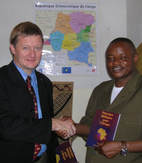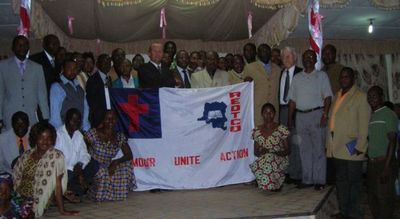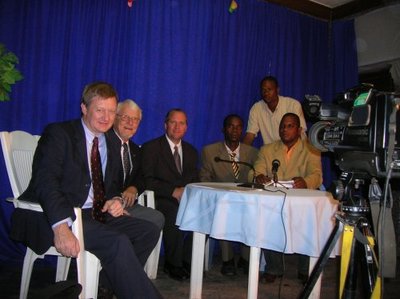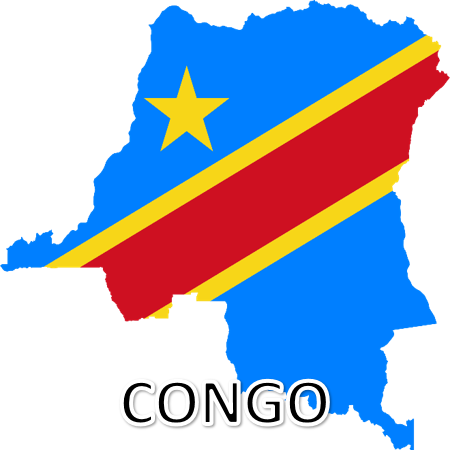 Conflict in the Congo has killed 4 million people in the last 8 years. For centuries, the Congo suffered at the hands of Muslim slave raiders. When the Belgians intervened, the Arab slave trade in the Congo was replaced with exploitation by some unscrupulous mining corporations. Since being granted independence in 1960, the Congo has been torn apart by a succession of civil wars, military coups, and unrestrained wholesale plundering of its resources by a succession of socialist dictators. After Sudan, the Congo is the second largest nation in Africa. The Congo covers 2,344,858 square kilometers including most of the Congo river system and much of the vast central African rain forest.
The Congo includes 450 different ethno-linguistic groups making up an estimated 60 million people. The Congo has long had a reputation for being Africa’s “hell hole.” It was the setting for Joseph Conrad’s 1899 book“The Heart of Darkness” – and the inspiration for Hollywood’s “Apocalypse Now” film. It’s a reputation which the nation’s rulers have consistently reinforced with post-independence chaos, widespread anarchy, endemic corruption, brutal violence and looting of the nation’s resources devastating the country’s infrastructure. Although the Congo has vast mineral resources and tremendous agricultural potential, it is one of the poorest counties in the world. At one point its previous president, Mobutu Sese Seko was reputed to have been the fifth richest person in the world while his nation was one of the poorest in the world. In the year 2000 the public debt of the Congo was calculated to be 166% of its GNP. At that time the average income per person was only $110 a year. Investigators claimed that Mobutu’s personal wealth was roughly equivalent to the collosal national debt! Mobutu was said to have “looted the country into paralysis.” The Congo’s fertile fields and tropical forests cover an area larger than the combined areas of California, Oregon, Montana, Colorado, New Mexico and Texas. The Congo is rich in diamonds, gold, copper, uranium and other precious metals. The huge Congo River has the potential to generate enough hydroelectric power to provide all the electrical needs of the entire continent. Yet, the majority of Congolese have to live without electricity, plumbing or access to education or medical services. Since independence the once efficient network of roads and railway lines have deteriorated and become overgrown by the jungle. Hospitals and health clinics have been looted and destroyed. Literally millions of Congolese have been massacred, often by the very soldiers and police who were meant to be protecting them. When the mission hospital at Nyankunde was attacked, an estimated 1,000 Christians were massacred. Survivors reported that the chaplain was first savagely tortured before being murdered in a most cruel way. Several hundred patients who survived the massacre fled on foot through a 170 km of dense jungle to report on the atrocity. Documenting the human rights abuses and persecution of Christians in the Congo can be overwhelming. Reports of kidnapping, torture, rape, mass executions and cannibalism abound. Immediately after independence in the 1960’s tens of thousands of Christians and hundreds of missionaries were martyred, particularly in the Communist Simba rebellion of 1964. After the Rwandan Holocaust in 1994, Rwandese and Ugandan forces struck across the border at the Hutu militias (Interahamwe) that had been responsible for the genocide and were being protected in the Congo. As the dictator Mobutu fled, rebel leader Laurent Kabila was able to seize power. But, in 1998, after Kabila turned against his previous allies, the Ugandan and Rwandese forces again invaded the Congo in support of Banyamulengu (Tutsi) rebels. Soon the armies of eight other nations were embroiled in the conflict in the Congo. Massive military aid and forces from Communist Angola, Zimbabwe, Namibia and Congo (Brazzaville) and the Central African Republic along with elements of the Sudan army supported Kabila’s forces in the West against the Rwandese and Ugandan forces in the East of this vast and troubled country. Along with local inter-ethnic conflicts and warlords, the Angolans aimed to liquidate the UNITA rebel bases, Sudan sought to punish Uganda for its aid of the SPLA in Southern Sudan, while the Rwandese hunted down the Hutu genocidists, and Zimbabwe’s army was used to enrich its generals and politicians at the expense of Congolese natural resources. Much of the country became a war zone, the playground of multiple foreign armies, and approximately 4 million were killed. Millions more flowed like a tidal wave of refugees across the land and spilled over into neighbouring countries. The destruction of communities, dislocation of families and social chaos caused by these catastrophic upheavals shattered the nation. Lawlessness, violence and large scale looting devastated much of the Congo. The Maoist president, Laurent Kabila, was shot dead in 2001. His 29-year-old son, Joseph Kabila, then assumed power and began a process of negotiating peace between the various warring armies. He appointed five of the opposing generals as Deputy Presidents and sought to integrate into a national army the soldiers who had previously been trying to kill one another. Despite its disastrous track record in being able to take bad situations and make them much, much worse, the United Nations was invited to oversee this attempt at peace in the Congo. Since 2000, the UN has spent billions on its peace-keeping mission in the Congo. With 17,500 troops in the Congo, MONUC is the largest UN force anywhere in the world. However, corruption has continued to cripple the country, and violence has continued unabated in several parts of the country. Now, as the Congo attempts to hold its first free elections ever, the logistical challenges are a nightmare. NGOs operating in the Congo describe it as: “Among the very worst places on earth”, “as broken, volatile and dangerous as ever”, “a record of human devastation unmatched in recent history” and “Africa’s ultimate hell hole!” Out of the Communist chaos of the Congo, the Christian church has emerged as the only viable national structure to survive the general social, political and economic collapse of the country. The growth of the church in the Congo over the last century has been dramatic. The number of Christians in the Congo has grown from 1.4% of the total population in 1900 to over 90% professing Christianity today. Of these 23 million are Roman Catholic (organised in 14,000 congregations). There are over 12 million Protestants including a million Presbyterians (in 525 congregations), half a million Methodists (in 3,750 congregations) and a hundred other Protestant denominations. The state’s school system has collapsed. The number of street children and orphans as a result of AIDS deaths and broken homes are staggering. Estimates exceed a million AIDS and war orphans. The government’s nationalization of hospitals and schools in the 1970’s was a disaster. Just about the only functioning schools are church run. The Catholics have dominated the education field, but Protestants are increasingly striving to rise to the challenge as well. There is a famine of Christian literature and an intense hunger for Christian books. There is also an intense and urgent need for leadership training at every level. Many nominal Christians have no clear grasp of repentance and faith in Christ. Animism, witchcraft and syncretism are also major problems. The vast swamp lands north east of Kinshasa include many communities which have never been effectively evangelized. The half a million Swahili speaking Muslims need to be reached with the Gospel. Despite the Muslims mounting considerable efforts to spread Islam in the Congo, very little has been done to try to reach Muslims for Christ. Despite the small Pygmy peoples of the Congo rain forests being despised and abused by the Congolese, there has been a tremendous turning to Christ amongst them. Nominally 30% of the Pygmies claim to be Christian. Because of the war and collapse of infrastructure, missionary involvement in the Congo has suffered drastically. There have been several evacuations of missionaries from whole regions. The number of missionaries officially in the Congo is misleading as most are actually based outside of the Congo. Much of the country needs to be re-evangelized. CONGO FOR CHRISTRev. Bill Bathman, Charl Van Wyk and I were invited to conduct Biblical Worldview Seminars in the Congo. Although the war is officially over, most of the infrastructure in the Congo is devastated and there is still instability. Despite sporadic ongoing violence in some parts of this vast country the churches in the Congo are dynamic.We experienced first hand the endemic corruption of government officials in the Congo when, within minutes of arriving, bribes were being openly demanded. Rev. Bill Bathman was taken into custody and his camera confiscated for taking a picture of the: “Welcome to Lubumbashi” sign! It took over an hour of intensive negotiations before they released Bill Bathman. And several more hours before the camera was returned.When Charl arrived to conduct a Biblical Worldview Seminar in Mbuji Mayi, in East Kasai province, a security official detained him in some back room at the airport wanting a bribe before he would be released! By God’s grace, the church officials managed to negotiate Charl out of this beauracratic trap without paying any bribe at all. We had been invited to conduct Biblical Worldview Seminars for church leaders and political candidates for the upcoming elections. The Congo is heading for its first elections ever. The “Democratic Republic of the Congo”, in its 46 years of independence from Belgium, has never been a democracy. The Congo has been afflicted by corrupt dictators and a series of devastating civil wars. Most roads are impassable and the jungle has overgrown much of the once efficient railway network. Even though the Congo has its own port access to the Atlantic Ocean, all of the exports and imports in Katanga province have to be transported up by rail and road from Durban in South Africa! The fact that a central African country with access to the sea would depend upon trucks and trains traveling the full length of South Africa, Botswana, Zimbabwe and Zambia illustrates what a degraded state the once efficient infrastructure of the Congo has fallen into. There was tremendous excitement over the shipment of over 800 copies of the new revised French translation of our “Biblical Principles for Africa” book. With the help of friends in Paris and Geneva, this greatly improved second edition of the French translation was printed in time for this mission and we were able to deliver them for the delegates to the Biblical Worldview Seminars in the Congo. The hunger for Bible teaching, literature and leadership training in the Congo was intense. Services and seminars started at 8 AM each morning and we were kept busy until late each night. On the first day we had over 500 pastors, teachers and political leaders participating in the Biblical Worldview Seminar, the next day this had grown to 800. On the third day we had approximately 1,000! The delegates included the mayor, a judge, some generals, political leaders and hundreds of pastors and teachers. We presented 12 lectures, and spent many hours in question and answer sessions, spoke on two T.V programmes and two radio interviews. Our hosts organised the seminars under the banner of REDTCO: The Gathering of the Children of God for the Transformation of the Congo. On Sunday we preached at 5 different congregations. The church where I preached was packed to overflowing with over 3,000 enthusiastic worshippers. The service lasted for over 4 ½ hours. Even after the service Christians gathered for further Bible teaching throughout the afternoon and evening. It was almost midnight when our team returned from ministering all Sunday. Please do continue to pray for the Christians in the Congo, and for REDTCO, as they attempt to mobilise churches to work together to win the Congo for Christ. “Declare His glory among the nations, His wonders among all peoples. For the Lord is great and greatly to be praised; He is also to be feared above all…” 1 Chronicles 16:24 – 25 Dr. Peter Hammond P.O. Box 74 Newlands 7725 Cape Town South Africa E-Mail: [email protected]
0 Comments
Leave a Reply. |
More Articles
All
Archives
March 2017
|
"And Jesus came and spoke to them, saying, “All authority has been given to Me in heaven and on earth.
Go therefore and make disciples of all the nations, baptizing them in the name of the Father and of the Son and of the Holy Spirit,
teaching them to observe all things that I have commanded you; and lo, I am with you always, even to the end of the age.” Amen.” Matthew 28: 18-20
Go therefore and make disciples of all the nations, baptizing them in the name of the Father and of the Son and of the Holy Spirit,
teaching them to observe all things that I have commanded you; and lo, I am with you always, even to the end of the age.” Amen.” Matthew 28: 18-20
|
P.O.Box 74 Newlands 7725
Cape Town South Africa |
|



 RSS Feed
RSS Feed
